Related Research Articles

Roger William Corman was an American film director, producer and actor. Known under various monikers such as "The Pope of Pop Cinema", "The Spiritual Godfather of the New Hollywood", and "The King of Cult", he was known as a trailblazer in the world of independent film.

Fabian Anthony Forte, professionally known as Fabian, is an American singer and actor.
Hammer Film Productions Ltd. is a British film production company based in London. Founded in 1934, the company is best known for a series of Gothic horror and fantasy films made from the mid-1950s until the 1970s. Many of these involve classic horror characters such as Baron Victor Frankenstein, Count Dracula, and the Mummy, which Hammer reintroduced to audiences by filming them in vivid colour for the first time. Hammer also produced science fiction, thrillers, film noir and comedies, as well as, in later years, television series.
American International Pictures LLC is an American film production company owned by Amazon MGM Studios. In its original operating period, AIP was an independent film production and distribution company known for producing and releasing films from 1955 until 1980, a year after its acquisition by Filmways in 1979.

Francis Thomas Avallone , better known as Frankie Avalon, is an American actor, singer, and former teen idol. He had 31 charting U.S. Billboard singles from 1958 to late 1962, including number one hits, "Venus" and "Why" in 1959. He is the earliest surviving singer to have scored a solo number one hit on the Billboard Hot 100.

Gidget is a 1959 American CinemaScope comedy film directed by directed by Paul Wendkos and starring Sandra Dee, Cliff Robertson, James Darren, Arthur O'Connell, and the Four Preps.
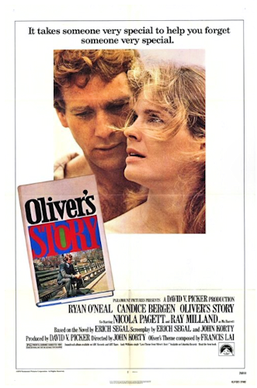
Oliver's Story is a 1978 American romantic drama film and a sequel to Love Story (1970) based on a novel by Erich Segal published a year earlier. It was directed by John Korty and again starred Ryan O'Neal, this time opposite Candice Bergen. The original music score was composed by Lee Holdridge and Francis Lai. It was released by Paramount Pictures on December 15, 1978.

John Ronald Smight was an American theatre and film director. His film credits include Harper (1966), No Way to Treat a Lady (1968), Airport 1975 (1974), Midway (1976), and Fast Break (1979).

Back to the Beach is a 1987 American comedy film starring Frankie Avalon and Annette Funicello, directed by Lyndall Hobbs. The original music score is composed by Steve Dorff. The film generated a total domestic gross of $13,110,903. It received a "two thumbs up" rating from Siskel and Ebert, who compared it favorably to Grease.

The beach party film is an American film genre of feature films which were produced and released between 1963 and 1968, created by American International Pictures (AIP), beginning with their surprise hit, Beach Party, in July 1963. With this film, AIP is credited with creating the genre. In addition to the AIP films, several contributions to the genre were produced and released by major and independent studios alike. According to various sources, the genre comprises over 30 films, with the lower-budget AIP films being the most profitable.
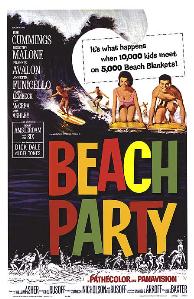
Beach Party is a 1963 American film and the first of seven beach party films from American International Pictures (AIP) aimed at a teen audience. This film is often credited with creating the beach party film genre.
Elliott Kastner was an American film producer, whose best known credits include Where Eagles Dare (1968), The Long Goodbye (1973), The Missouri Breaks (1976), and Angel Heart (1987).
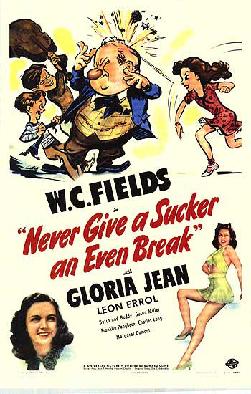
Never Give a Sucker an Even Break is a 1941 American comedy film directed by Edward F. Cline and starring W. C. Fields, Gloria Jean, and Leon Errol. Fields also wrote the original story, under the pseudonym Otis Criblecoblis. Fields plays himself, promoting an extravagant screenplay he has written. As he describes the script to a skeptical producer, the often surreal scenes are shown. It was produced and distributed by Universal Pictures. In some international releases it was known by the alternative title What a Man!

Muscle Beach Party is the second of seven beach party films produced by American International Pictures. It stars Frankie Avalon and Annette Funicello and was directed by William Asher, who also directed four other films in this series.
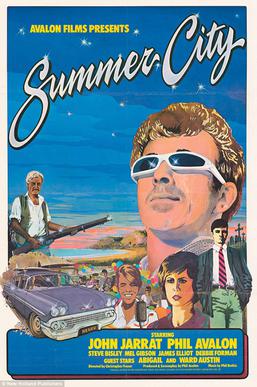
Summer City is a 1977 Australian drama thriller film, filmed in Newcastle, Australia. It marked Mel Gibson's film debut.
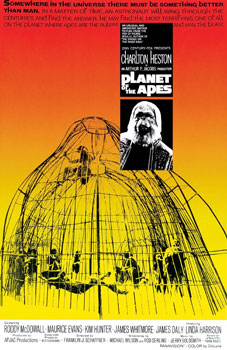
Planet of the Apes is a 1968 American science fiction film directed by Franklin J. Schaffner from a screenplay by Michael Wilson and Rod Serling, loosely based on the 1963 novel by Pierre Boulle. The film stars Charlton Heston, Roddy McDowall, Kim Hunter, Maurice Evans, James Whitmore, James Daly, and Linda Harrison. In the film, an astronaut crew crash-lands on a strange planet in the distant future. Although the planet appears desolate at first, the surviving crew members stumble upon a society in which apes have evolved into creatures with human-like intelligence and speech. The apes have assumed the role of the dominant species and humans are mute primitives wearing animal skins.

Hell on Frisco Bay is a 1956 American CinemaScope film noir crime film directed by Frank Tuttle and starring Alan Ladd, Edward G. Robinson and Joanne Dru. It was made for Ladd's own production company, Jaguar.
Phillip Avalon is an Australian writer, producer, director and actor of films and TV.
Denis Whitburn is an Australian film writer and producer.
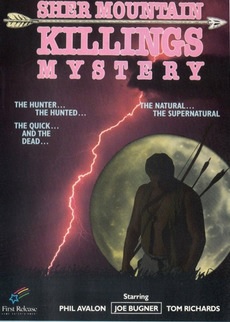
Sher Mountain Killings Mystery is a 1990 Australian film directed by Vince Martin and Phillip Avalon. This film is categorized as an "Ozploitation" horror film. The synopsis for this film is “Nobody trusted that the Gem has mysterious power. From thieves’ perspectives, it was just another jewel. But not everything is as it appears .’ The film differentiate itself from other horror film with the concepts such as Old Ranger’s castle, cursed stone and Mysterious power which adds more Australianness tone to the film.
References
- ↑ "Production Survey", Cinema Papers, September 1987 p66
- ↑ Avalon p 194
- ↑ "Australian Films at the Australian Box Office", Film Victoria Archived 9 February 2014 at the Wayback Machine accessed 24 October 2009
- ↑ Avalon, Phil (2015). From Steel City to Hollywood. New Holland. pp. 191–197.
- ↑ David Stratton, The Avocado Plantation: Boom and Bust in the Australian Film Industry, Pan MacMillan, 1990 p36-361
- ↑ Avalon p 194
- ↑ Avalon p 194
- ↑ Avalon p 195
- ↑ Avalon p 197
- ↑ Avalon p 197